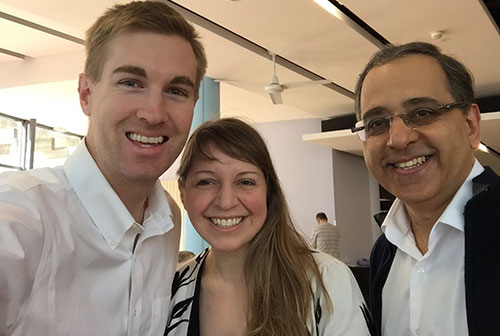
In April 2016, Lesley Everett and Clay Bavinger, fourth year medical students at the University of Michigan, traveled to Paris, France for one-month electives in clinical and research ophthalmology. They were supported by the medical center’s Global Reach Program and the Kellogg Eye Center for International Ophthalmology. Their program was arranged and coordinated in Paris by Katia Marazova, MD, PhD and Laura McMaster, MSc.
Dr. Everett
With a forthcoming MD and a PhD in genetics, Dr. Everett was placed in the retinal genetics laboratories of Isabelle Audo, MD, PhD and Christina Zeitz, PhD at the Institut de la Vision, the largest free-standing ophthalmic research institute in Europe. Dr. Everett’s placement was facilitated by Kellogg research scientist Patrice Fort, PhD, who had completed his degree at the Institut under the direction of Jose-Alain Sahel, MD, PhD, one of France’s most eminent ophthalmic scientists. Dr. Everett’s project focused on using databases to identify novel candidate genes in inherited retinal dystrophies.
She got right to work, developing a prioritized list of candidate genes for 11 families under study at the Institut. Within 10 days of arrival, she was already presenting her results at a scientific seminar.
Dr. Everett also joined Dr. Audo in her retinal genetics and rare diseases clinic, where she encountered families recruited to participate in genetic research studies. She commented that “it was rewarding to be able to observe both the clinical and basic research aspects of their work.”
She supplemented her research with attendance at lectures and seminars on retinal gene therapy, regenerative medicine, optogenetics, and retinal implants at the Institut and Collège de France.
She deepened her understanding of how clinical trials are managed by observing the Clinical Investigation Center (CIC) of the Quinze-Vingts Hospital, founded in 1260 by France’s King Louis IX. Initially established as the National Reference Center for Inherited Retinal Dystrophies, the CIC currently runs 55 funded clinical trials in age-related macular degeneration, inherited eye diseases, diabetic retinopathy, retinal vein occlusion, glaucoma, and corneal diseases.
An important part of her elective involved attendance at the genetic counseling and neuro-ophthalmology clinics of Paris’ famous Fondation Ophtalmologique Adolphe Rothschild, a hospital founded over 100 years ago for the care of ophthalmic disorders. It has since expanded its activities to include neurology, neurosurgery, otolaryngology, and neuroradiology. Her experience at Rothschild allowed her to discover “the critical differences between public and private medical institutions in Paris, and about the national healthcare system and residency training in France.”
Summarizing her month in Paris, Dr. Everett wrote: “it was a tremendously valuable and educational experience, one that will serve as the perfect introduction for my upcoming residency training in ophthalmology and my future research pursuits in ophthalmic genetics. I established many new professional relationships. I look forward to interacting with these colleagues at future ophthalmology meetings, and hopefully establishing future collaborations with Drs. Audo and Zeitz.”
Dr. Bavinger
Dr. Bavinger was placed primarily at Fondation Rothschild and at Hôpital Lariboisière. At Rothschild, he joined the retina clinic of Yannick Le Mer, MD, where he observed the examination of patients. At Lariboisière, he linked into a research project dedicated to developing retinal imaging under the direction of Ramin Tadayoni, MD. He especially recalls a joint laboratory meeting of the research groups of Institut director Jose-Alain Sahel, MD, PhD, and Robert MacLaren, MD, professor of ophthalmology at the University of Oxford (England), who has developed pathbreaking work on gene therapy for choroideremia, a rare blinding retinal disorder. Dr. Bavinger reported that “Dr. Maclaren encouraged me to consider a fellowship in his retina program after I complete my ophthalmology residency.”
Dr. Bavinger was impressed with differences between healthcare delivery in the United States and in France. In Paris, “rarely was payment mentioned due to France’s socialized medicine system. I never heard patients say they would have trouble taking time off of work to come to a medical appointment. I was told that labor laws in France stipulate easy access to sick days to come to the doctor.
However, I noticed some deficiencies in the French medical system. Patients wait very long to schedule appointments, and they wait all day in the office to be seen. The facilities are also relatively poor-- overcrowded waiting rooms and few restrooms. Specialty care is concentrated in Paris. Many patients travel from all over France to reach the retina specialists in Paris.
I also noticed many differences in resident education in Paris. Trainees get less assistance from nurses and technicians. As a result, residents spend much time performing duties that would be deemed non-educational in the United States, including taking ophthalmologic photographs and measuring visual acuity. Also, residents are not assigned to a specific hospital or program, but to a city. In Paris, residents rotate every 6 months between hospitals. Many residents and faculty commented that this creates a non-centralized and non-programmatic training environment, and that it is easy to go through residency with serious gaps in knowledge.”
But the two University of Michigan medical graduates agreed that their time abroad was “invaluable.” They are encouraging their successors to take advantage of the connections that the Kellogg Eye Center for International Ophthalmology has developed in Paris.
